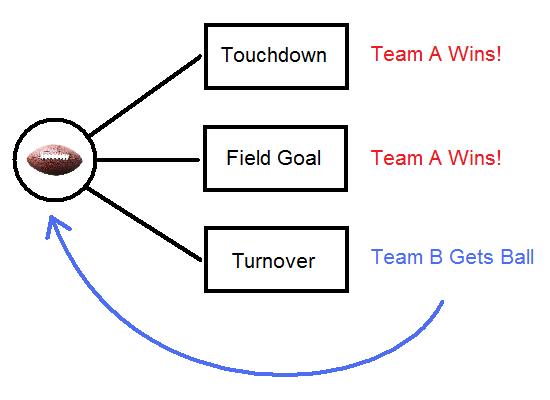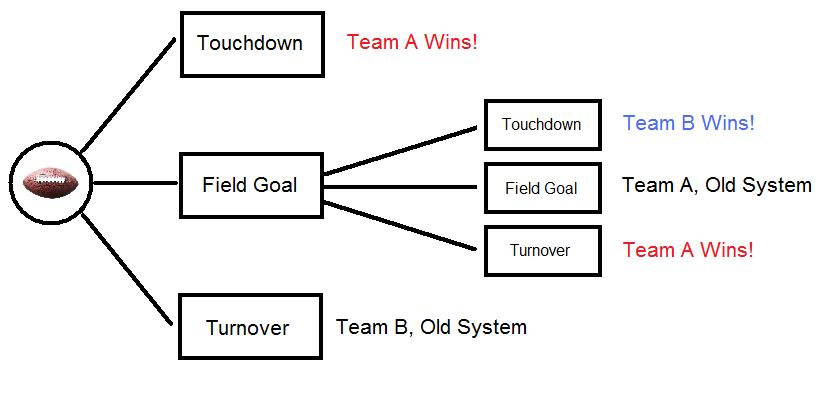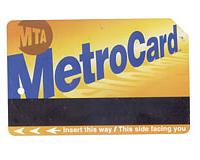At the beginning of the 2011 playoffs, the NFL implemented a new set of overtime rules that drastically altered how tie games would be decided. The rules entail many significant strategic consequences, and I’m not sure how well-understood those consequences are.
The old overtime rule is straightforward: initial possession of the ball in overtime is determined by a coin-toss, and the first team to score is the winner. Critics of this model argued that since initial possession of the ball was such an advantage, awarding it based on a coin-toss essentially made the outcome of the game equivalent to a coin-toss. The argument seems reasonable, although whether the data backs it up is a story for another time.
The NFL’s new system tries to counterbalance the advantage of initial possession. From here on out, let’s call the team that wins the coin-toss, and therefore begins overtime with the ball, Team A. In the new system, Team A can win the game on its initial possession only if they score a touchdown. If Team A scores a field goal on their initial possession, Team B will receive the ball and have a possession to then try to win or tie the game.
Here is a diagram illustrating the old system. The basic idea here is if Team A scores, they win. If they don’t, then Team B gets the football and starts at the front of the graph.
The basic idea here is if Team A scores, they win. If they don’t, then Team B gets the football and starts at the front of the graph.
Here’s a graph representing the new system.
This system is far more complex. First of all, Team A now has a great incentive to try for a touchdown on its first possession, whereas under the old system, they had virtually no incentive to do so. Furthermore, the value of a field goal for Team A on its initial possession has been greatly decreased. Under the old system, a first-possession field goal won the game. Under the new system, its value is considerably less. What are the consequences of these new realities?
What are the consequences of these new realities?
Consider a long field goal on the initial possession. Make it, and your opponent gets the ball and can beat you with a touchdown or tie you with a field goal. Miss it, and your opponent will have good field position and now can beat you with a field goal. Perhaps punting is the better option: you gain field position and if you defend successfully, you get the ball back and now all you need is a field goal to win.
Even more interesting is a short field goal attempt on the initial possession. Make it, and your opponent still gets field position and a chance to beat or tie you. Why not go for a touchdown? You win outright if you succeed, and if you don’t, not only does your opponent get poor field position, but if you defend successfully you’ll only need a field goal to win.
Because of the altered values of touchdowns and field goals mentioned above, I think 4th down strategies on the initial possession should be modified as well. As complex as it is, at least the new system reverts to the old ruleset after (at most) two possessions.
As interesting as the many consequences of these rule changes are, I still think the “first to six” idea makes more sense. We’ll see what happens this weekend!
Related Posts
 This is a cool summary of 2010 in terms of Facebook-related statistics:
This is a cool summary of 2010 in terms of Facebook-related statistics:


